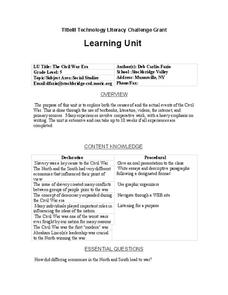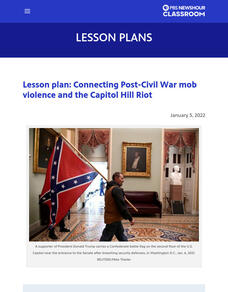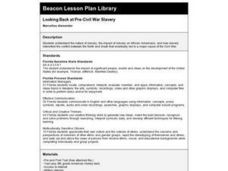Curated OER
The Civil War Era
Fifth graders explore both the causes of and the actual events of the Civil War. They write essays and descriptive paragraphs and explore a variety of websites. They create a series of skits highlighting the key points of the Civil War era.
Curated OER
Claiming Common Ground? The Civil War and the Preservation of Claiming Common Ground? The Civil War and the Preservation of George Washington's Mount Vernon
Students explore how people viewed George Washington in the 19th Century. In this U.S. History lesson, students create a timeline of events during the Civil War, including government and court decisions. Following this activity,...
Curated OER
Literature Focus Unit: Civil War
Fourth graders complete a two-week unit on the U.S. Civil War and the Underground Railroad. They read the books "Follow the Drinking Gourd" and "Pink and Say," complete story maps, and dramatize a scene from "Follow the Drinking Gourd."...
Curated OER
Technologies of the Civil War
Fifth graders discover new and interesting technologies of the Civil War. In this Civil War portfolio of lessons, 5th graders analyze primary resources, develop new vocabulary, investigate websites, and create a time line of new...
Curated OER
American Journey: The Civil War
Utilize this worksheet package if you are looking for basic Civil War coverage. Much of the plan is disabled, however the worksheets contain 2 simple texts that pupils can read, mark, and respond to in 2 comprehension questions that...
Curated OER
African Americans After the Civil War
Young historians learn what life was like in the South during the Reconstruction era. They complete hands-on-activities and participate in group discussion to understand how experiences varied between African Americans and white...
PBS
Connecting Post-Civil War Mob Violence and the Capitol Hill Riot
Anti-democratic violence is not new in the United States. Learners watch videos and then compare and contrast the 1873 Colfax and the 1898 Wilmington massacres. They then watch a video about the Capitol Hill insurrection of 2021 and...
Curated OER
Civil War
Fifth graders discuss the causes of the Civil War and write a paragraph summarizing each identified event. In the computer lab, 5th graders create a PowerPoint presentation explaining events leading up to the Civil War. They use the...
Curated OER
Who Fought for the Union?
Learners read New York Times articles, letters, and listen to songs written from a soldier's perspective during the Civil War in order to understand who was fighting in the Union Army. This is a great lesson, complete with weblinks,...
National Endowment for the Humanities
Factory vs. Plantation in the North and South
North is to factory as South is to plantation—the perfect analogy for the economy that set up the Civil War! The first lesson plan in a series of five helps teach beginners why the economy creates a driving force for conflict. Analysis...
Teach With Movies
Learning Guide for: Glory
Invite your class to learn about the first regular US army unit composed of black soldiers during the Civil War with the film Glory. This website reviews the historical accuracy of the movie, offers pre- and post-viewing handouts, and...
Tennessee State Museum
An Emancipation Proclamation Map Lesson
Did the Emancipation Proclamation free all slaves during the Civil War? Why was it written, and what were its immediate and long-term effects? After reading primary source materials, constructing political maps representing information...
Curated OER
The Civil War/ A Unit Overview
Eleventh graders will look at the causes of the Civil War in detail. A brief unit on the war itself will follow. Battles, historical figures, and daily life will be studied. The webpage is a link to many different related lessons.
Curated OER
Looking Back at Pre-Civil War Slavery
Eighth graders explain the nature of slavery, the impact of slavery on African-Americans, and how slavery intensified the conflict between the North and South that eventually led to a major cause of the Civil War.
American Battlefield Trust
John Brown
How did the raid on Harper's Ferry contribute to the start of the Civil War? Curated for high school historians, the activity explains John Brown's contribution to the start of the Civil War by using violence to demand an end to slavery....
University of California
The Civil War: Secession of the South
Was the Southern states' decision to secede from the Union protected by the United States Constitution? Eighth graders discuss the constitutionality of the South's justification for secession, particularly the secession of South...
Center for History Education
Did Southern Free Men of Color Fight for the Ideals of the South?
Much of history is distasteful. Primary sources often reveal attitudes acceptable at the time that no longer are. But to understand controversial historical events, historians must examine primary sources that represent a wide variety of...
American Battlefield Trust
Pre-1860: Disunion
Using personas ranging from freed African Americans to wealthy plantation owners, young historians consider various points of view around the events in the days leading up to the Civil War including major milestones such as the Dred...
Center for History Education
Maryland During the Secession Crisis
While many think the United States was neatly divided between Northern and Southern states during the Civil War, border states like Maryland are more complicated. Using hands-on activities to measure distance and primary sources,...
Curated OER
Sequence, Predict, Infer: Pink and Say
Practice sequencing with your 2nd graders via Patricia Polacco's Civil War book Pink and Say. Begin with a blindfold and a bag of mystery items. Connect their use of clues to identify what they can't see with the skill of making...
NET Foundation for Television
1850-1874 The Kansas-Nebraska Act
How the Kansas-Nebraska Act created Bleeding Kansas is complicated—until scholars research and examine documents from the time. After completing activities that include mapping, photo, document analysis, and discussion, learners...
American Battlefield Trust
Pre-1861: Disunion
Nat Turner, John Brown, and Abraham Lincoln all played a key role in the run-up to the bloody American Civil War. Using a PowerPoint, timeline activity, and essay prompt, young historians consider the roles of these men and more to...
Alabama Department of Archives and History
Alabama's Secession in 1861: Embraced with Joy and Great Confidence. Why?
From December 20, 1860 to June 8, 1861, eleven states seceded from the Union. Alabama seceded on January 11, 1861. Why did so many white Alabamians want to secede? Why did they believe the South could win the war? These are the essential...
K20 LEARN
The Emancipation Proclamation: Expanding The Goals Of The Civil War
Should Juneteenth be recognized as a national holiday? To prepare to take a stance on this question, young historians first analyze the Emancipation Proclamation and compare it to Lincoln's first Inaugural Address. Scholars then read an...

























